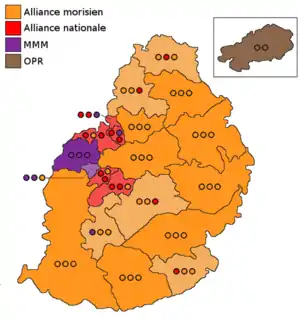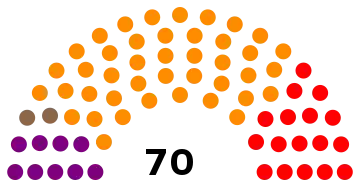2019 Mauritian general election
General elections were held in Mauritius on 7 November 2019. The result was a victory for the Mauritian Alliance, a coalition of the Militant Socialist Movement (MSM), Muvman Liberater, Alan Ganoo Movement and Plateforme Militante, which won 42 of the 70 seats. Pravind Jugnauth of the MSM remained Prime Minister.
| ||||||||||||||||||||||||||||||||||||||||||||
All 70 seats in the National Assembly 35 seats needed for a majority | ||||||||||||||||||||||||||||||||||||||||||||
|---|---|---|---|---|---|---|---|---|---|---|---|---|---|---|---|---|---|---|---|---|---|---|---|---|---|---|---|---|---|---|---|---|---|---|---|---|---|---|---|---|---|---|---|---|
| ||||||||||||||||||||||||||||||||||||||||||||
 Directly elected seats by parties and constituencies | ||||||||||||||||||||||||||||||||||||||||||||
| ||||||||||||||||||||||||||||||||||||||||||||
.svg.png.webp) |
|---|
| Constitution |
Electoral system
The National Assembly has 62 elected members elected in 20 three-seat constituencies and one two-seat constituency (the island of Rodrigues). The elections are held using the block vote system, whereby voters have as many votes as there are seats available.[1]
In addition to the elected members, the Electoral Supervisory Commission has the power to appoint a further eight members. The additional members are chosen from amongst the unsuccessful candidates who received the highest number of votes, and are appointed with the aim of balancing the parliamentary representation of different ethnic groups.[2]
Results
The ruling Militant Socialist Movement (MSM) won over half of the seats in Parliament, meaning incumbent Prime Minister Pravind Jugnauth, who took over from his father Anerood Jugnauth in 2017, will serve a full five-year term as Prime Minister.[3]
Of the 62 directly-elected seats, the MSM won 38, the Labour Party won 14, the Mauritian Militant Movement (MMM) won 8, and the Rodrigues People's Organisation (OPR) won 2 seats from the island of Rodrigues.[3]
 | ||||||||
|---|---|---|---|---|---|---|---|---|
| Party | Votes | % | Seats | |||||
| Cons | BL | Total | ||||||
| Mauritian Alliance (MSM–ML–MAG–PM) | 805,036 | 37.68 | 38 | 4 | 42 | |||
| National Alliance (PTR–PMSD–MJCB) | 699,807 | 32.76 | 14 | 3 | 17 | |||
| Mauritian Militant Movement | 439,402 | 20.57 | 8 | 1 | 9 | |||
| Reform Party | 30,350 | 1.42 | 0 | 0 | 0 | |||
| Rodrigues People's Organisation | 20,777 | 0.97 | 2 | 0 | 2 | |||
| Parti Kreol Morisien | 19,302 | 0.90 | 0 | 0 | 0 | |||
| 100 Citoyens | 19,199 | 0.90 | 0 | 0 | 0 | |||
| Mauritian Solidarity Front | 12,898 | 0.60 | 0 | 0 | 0 | |||
| Mauritian Social Democrat Party | 10,975 | 0.51 | 0 | 0 | 0 | |||
| Lalians Lespwar | 7,104 | 0.33 | 0 | 0 | 0 | |||
| Parti Malin | 5,291 | 0.25 | 0 | 0 | 0 | |||
| Regroupement Socialiste Militant | 4,849 | 0.23 | 0 | 0 | 0 | |||
| Les Verts Fraternels | 4,803 | 0.22 | 0 | 0 | 0 | |||
| Lalit | 4,119 | 0.19 | 0 | 0 | 0 | |||
| Mouvement Mauricien Social Démocrate | 3,568 | 0.17 | 0 | 0 | 0 | |||
| Forum des Citoyens Libres | 3,189 | 0.15 | 0 | 0 | 0 | |||
| Rodrigues Movement | 2,462 | 0.12 | 0 | 0 | 0 | |||
| Front Patriotique Rodriguais Ecologique | 1,656 | 0.08 | 0 | 0 | 0 | |||
| Mouvman Zeness Morisien | 1,409 | 0.07 | 0 | 0 | 0 | |||
| Parti Lumière | 1,307 | 0.06 | 0 | 0 | 0 | |||
| Muvman Independantis Rodriguais | 1,231 | 0.06 | 0 | 0 | 0 | |||
| Mouvement Ene Sel Direction | 1,080 | 0.05 | 0 | 0 | 0 | |||
| Mouvement Democratique Mauricien | 588 | 0.03 | 0 | 0 | 0 | |||
| Ralliement Citoyen Pour La Patrie | 503 | 0.02 | 0 | 0 | 0 | |||
| Republicain En Marche | 493 | 0.02 | 0 | 0 | 0 | |||
| Front Socialiste | 443 | 0.02 | 0 | 0 | 0 | |||
| Rassemblement Socialiste Mauricien | 342 | 0.02 | 0 | 0 | 0 | |||
| Mouvement Entrepreneurs | 285 | 0.01 | 0 | 0 | 0 | |||
| Small Planters, Labourers and Farmers Party | 275 | 0.01 | 0 | 0 | 0 | |||
| Liberte sans Frontiere | 236 | 0.01 | 0 | 0 | 0 | |||
| La Republique En Marche | 228 | 0.01 | 0 | 0 | 0 | |||
| Mouvement Authentique Mauricien | 206 | 0.01 | 0 | 0 | 0 | |||
| Party L'histoire Moris Selectif | 169 | 0.01 | 0 | 0 | 0 | |||
| La Plateforme Sociale Curepipienne | 78 | 0.00 | 0 | 0 | 0 | |||
| Four Cats Political Party | 70 | 0.00 | 0 | 0 | 0 | |||
| Alliance pour L'Unité Mauricienne | 61 | 0.00 | 0 | 0 | 0 | |||
| Mauritian National Congress | 57 | 0.00 | 0 | 0 | 0 | |||
| Socialiste Militant Progressiste | 53 | 0.00 | 0 | 0 | 0 | |||
| Independents | 32,512 | 1.52 | 0 | 0 | 0 | |||
| Total | 2,136,413 | 100.00 | 62 | 8 | 70 | |||
| Valid votes | 718,398 | 99.06 | ||||||
| Invalid/blank votes | 6,838 | 0.94 | ||||||
| Total votes | 725,236 | 100.00 | ||||||
| Registered voters/turnout | 941,719 | 77.01 | ||||||
| Source: OEC, OEC, OEC, OEC | ||||||||
Aftermath
Following the announcement of the results and the formation of a new government, several legal petitions were lodged in Supreme Court challenging the validity of the results, claiming electoral irregularities, a lack of transparency, undue influence by political activists and allegations of fraud and electoral bribery.[4] The presence of independent monitors was claimed to have been ineffective.[5] The government was also criticised for its intensive use of state media.[6] Murdered activist Kistnen was rumoured to be about to disclose details of how 1,200 Bangladeshi nationals had been taken to vote multiple times in different constituencies and that the MSM had exceeded spending limits.[7] However, according to international observers from the SADC and from the French diplomacy, the election was free and fair.[8][9]
References
- Electoral system IPU
- General information IPU
- Jean Paul Arouff. "Mauritius elects incumbent PM for five-year term". www.nasdaq.com. Retrieved 8 November 2019.
- Kasenally, Roukaya (8 January 2020). "2019 General election in Mauritius: Is our democracy in danger?". L'Express. Retrieved 8 January 2020.
- "Contestation des élections: quels autres recours que la justice pour l'opposition ?". L'Express. November 2019.
- Spooner, Moina. "How Pravind Jugnauth clinched the win in Mauritius' elections". The Conversation.
- Jasodanand, Narain (28 December 2020). "Affaire Kistnen: une bande organisée sévit-elle en toute liberté et sous haute protection?". L'Express. Retrieved 28 December 2020.
- "Mauritius: SADC Observer Mission Endorses Mauritius Poll". 11 November 2019.
- "Présentation de Maurice".
_(cropped).jpg.webp)
.jpg.webp)
.jpg.webp)